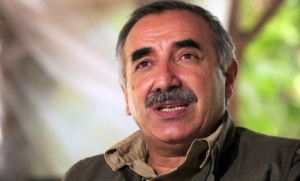nsnbc : Murat Karayilan, a member of Kurdistan Workers Party (PKK)’s Executive Council, has condemned Turkey’s offensive in Afrin, Syria, as racially-motivated and part of Turkey’s larger problem with the Kurdish nation. He also questioned how world leaders can say they understand Ankara’s concerns.
 Turkey’s problem with Afrin is based on “racism and enmity for Kurds,” said Murat Karayilan on Friday in an interview with Ronahi TV, a media outlet with ties to the Kurdistan Workers Party.
Turkey’s problem with Afrin is based on “racism and enmity for Kurds,” said Murat Karayilan on Friday in an interview with Ronahi TV, a media outlet with ties to the Kurdistan Workers Party.
On that basis, the PKK leader also questioned on what basis members of the international community were expressing sympathy with Turkey. “Regarding Turkish security, some officials from the US and other countries say ‘We understand Turkish concerns.’ What concerns?” he asked.
U.S. President Donald Trump, in a phone call this week with his Turkish counterpart, urged Turkey to “avoid civilian casualties,” but said that he was open to discussing “Turkey’s legitimate security concerns.” Washington has, moreover, signalled that it would stop supplying weapons to the Syrian Kurdish People’s Protection Units (YPG).
The UK’s Foreign Secretary Boris Johnson said that “Turkey is right to want to keep its borders secure.” The Turkish army and allied Turkey-backed Syrian militias under the banner of the Free Syrian Army and Turkmen “rebels”, among others, launched their operation, ironically dubbed “Operation Olive Branch” on the Kurdish enclave of Afrin in Rojava, northwestern Syria on January 20.
Both the YPG and the U.S.-backed Syrian Democratic Forces (SDF) of which the YPG is the main constituent, have repeatedly stressed that they do not and will not pose any threat to Turkey, and that they do not challenge the territorial integrity of the Syrian Arab republic either.
Turkey considers Kurdish forces in Rojava a threat and the ruling party an extension of the PKK, which has been named a terrorist organization by Turkey, the US, and the EU. While the ruling PYD and the armed YPG follow the doctrine of PKK founder Abdullah Ocalan, they assert that they have no organizational ties with the group. One might note, though, that banners with the portrait of Öcalan are present at most if not all PYD / YPG events and in their offices. The fact has – to some degree – embarrassed the U.S. and made it more difficult for the U.S. to contain Ankara’s dissatisfaction.
Ankara claims Kurdish forces use the hill tops of Afrin to launch rockets on Turkish villages and more than 700 attacks on Turkey were carried out from Syrian territory in 2017. The YPG, for its part, has complained over countless, well-documented attacks by Turkey-backed insurgents and Turkish military. The YPG called on troops fighting with Turkey-backed militia and stressed that they – if they want to defend Syria and regret being used as cannon fodder for Turkey – could safely surrender to YPG forces at the nearest points of contact before it would be too late to regret and safely surrender.
Karayilan accused Turkey of making up stories to legitimize their offensive. “The world has to know that this country [Turkey] can make a flood from a glass of water… There is no danger to Turkey. They fabricate scenarios and lies and disperse them around the world,” he said. Kurdish groups carved out a self-autonomous region in northern Syria when conflict between opposition groups and Damascus took over the country. The YPG has been widely recognized as the United States most effective ally in the fight against the Islamic State.
Turkish officials have insisted they cannot allow the creation of a Kurdish state on their border, saying it is a matter of national security, but contend they are opposed to the PYD and YPG, not the Kurdish population. A veteran Kurdish politician recently warned Turkey against its ambitions in Syria. “If Turkey enters Afrin, the problems will not be solved,” Ahmet Turk said in an interview with Germany’s DW media published on January 18, adding that Turkey cannot eliminate 40 million Kurds in Middle East with threats.
Former Iraqi Kurdish KRG president and current Peshmerga leader Masoud Barzani, a member of the Kurdistan Democratic part, said on Friday that the military option is not a solution. The Iraqi Kurdish Patriotic Union of Kurdistan (PUK) declared earlier this week that it “would like to” deploy Peshmerga fighters to Afrin “if it were possible”.
CH/L – nsnbc 27.01.2018
Source Article from https://nsnbc.me/2018/01/27/pkk-leader-questions-world-leaders-stance-on-turkeys-invasion-of-afrin/
Related posts:
Views: 0
 RSS Feed
RSS Feed

















 January 30th, 2018
January 30th, 2018  Awake Goy
Awake Goy 










 Posted in
Posted in  Tags:
Tags: 
















